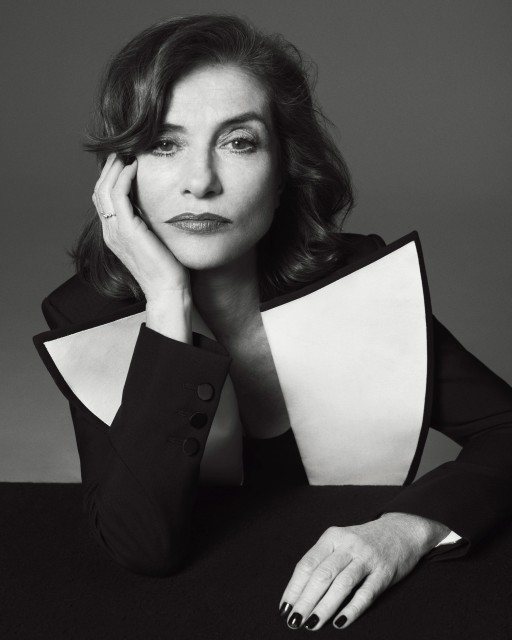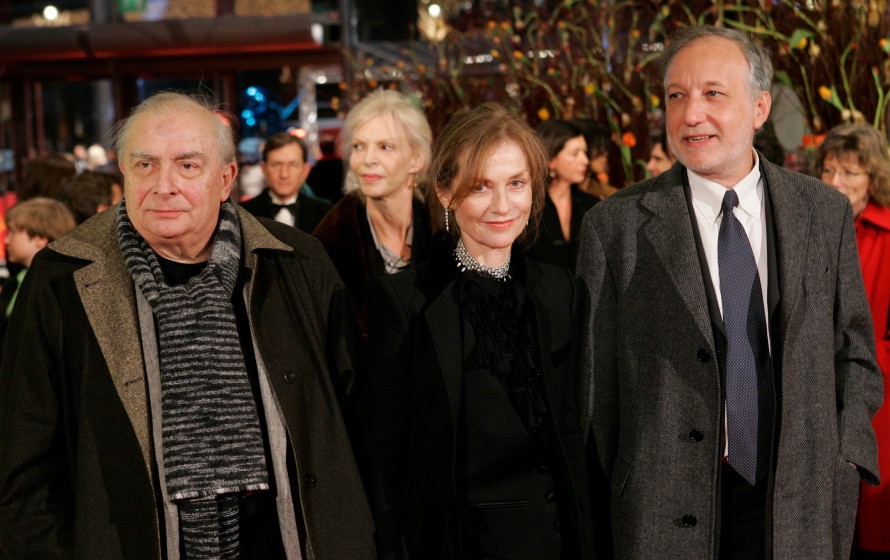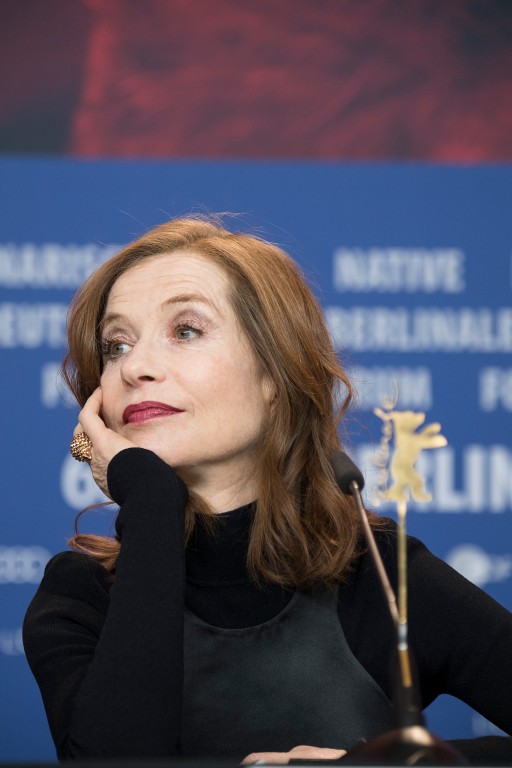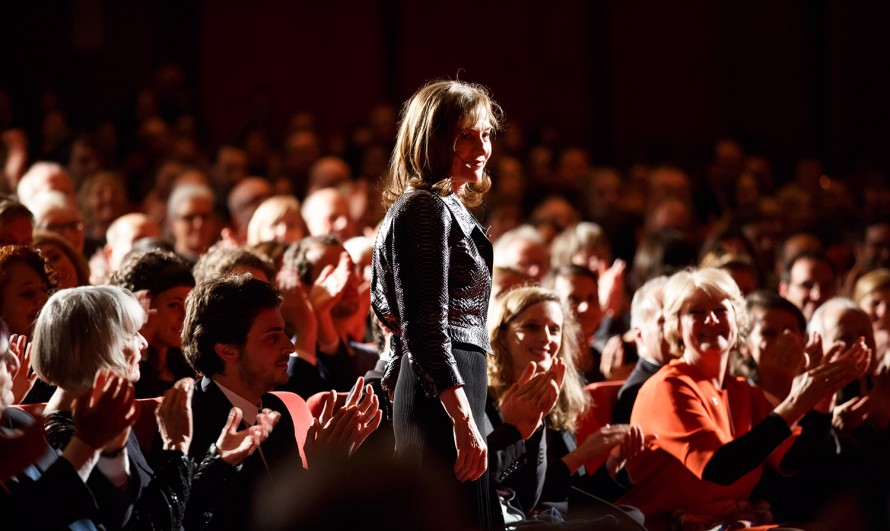2022 | Homage
Isabelle Huppert
The Homage section of the 72nd Berlin International Film Festival was dedicated to French film and stage actor Isabelle Huppert, who was awarded an Honorary Golden Bear for lifetime achievement.
In conjunction with the Award Ceremony on February 15, at the Berlinale Palast, the festival screened À propos de Joan (About Joan, dir: Laurent Larivière).

“People think that, during a shoot, a director helps the actors play a role. Isabelle helps the director shoot the film”.
Those words, reportedly uttered by Claude Chabrol, describe an actor who is as original as she is unique. Isabelle Huppert – more versatile than almost any other, yet unmistakable. “The cliché that an actor slips into the skin of another person should be tossed out in my opinion”, she has said, “because I am me, and the character comes by accident”.
Isabelle Huppert was born in Paris. Her father was a security engineer and successful businessman, her mother an English teacher and enthusiastic amateur pianist. Among her five siblings is writer and essayist Rémi Huppert, screenwriter and novelist Elisabeth Huppert, sociologist and professor emeritus at HEC Paris Jacqueline Laufer, and Caroline Huppert, a director and screenwriter with whom Isabelle Huppert has worked several times.
Huppert grew up in Ville d’Avray, and went to school in nearby Versailles, where she also studied acting at the conservatory. Huppert went on to study acting in Paris at the École Nationale Supérieure des Arts et Techniques du Théâtre (ENSATT), and the Conservatoire National Supérieur d’Art Dramatique (CNSAD). She was taught by Jean-Laurent Cochet and Antoine Vitez. She also took Russian at the Institut national des langues et civilisations orientales (INALCO).
Isabelle Huppert made her screen debut with Faustine et le bel été (Faustine and the Beautiful Summer, dir: Nina Companéez) and soon began attracting notice for her performances in César et Rosalie (Cesar & Rosalie) by Claude Sautet, Les valseuses (Going Places) by Bertrand Blier, and Le juge et l’assassin (The Judge and the Assassin) by Bertrand Tavernier. She won the BAFTA as Most Promising Newcomer to Leading Film Roles for her portrayal of the title character in Claude Goretta’s La dentèlliere (The Lacemaker).

Isabelle Huppert with Claude Chabrol and François Berléand at the premiere of L'Ivresse du pouvoir in 2006
Violette Nozière was the first of many collaborations with director Claude Chabrol. Huppert was rewarded for her intense portrayal of the notorious 1920s murderer with the Silver Palm for Best Actor in Cannes. Among the other films she made with Chabrol are the period drama of a wartime abortionist, Une affaire des femmes (Story of Women), the adaptation of a Ruth Rendell book, La cérémonie, and the psychological thriller Merci pour le chocolat (Nightcap).
Isabelle Huppert’s first outing in front of the camera in the USA was Michael Cimino’s avant-garde western epic Heaven’s Gate. Over time, she then worked with top Hollywood directors such as Otto Preminger (Rosebud), Joseph Losey (La truite), Curtis Hanson (The Bedroom Window), Hal Hartley (Amateur), and David O. Russell (I Heart Huckabees). But first and foremost, Huppert is a committed and artistically discerning member of the auteur cinema circle – not only in France, but across Europe.
In the 1980s Jean-Luc Godard casted her as the lead in his Sauve qui peut (la vie) (Every Man for Himself) and Passion. She can count André Téchiné, Maurice Pialat, Patrice Chéreau, Jacques Doillon, Claire Denis, and Olivier Assayas among the other greats of French cinema with whom she has worked.
One of Huppert’s many international successes was her appearance in the murder mystery musical 8 femmes (8 Women), directed by François Ozon. Alongside the rest of the ensemble cast, she won a Silver Bear at the Berlinale, as well as garnering the European Film Award. Mia Hansen Løve’s L’Avenir (Things to Come) also premiered in Berlin, as well as this year’s French-German co-production À propos de Joan (About Joan), directed by Laurent Larivière.

2018: At the Press Conference for Eva by Benoît Jacquot
Isabelle Huppert’s entree to European cinema was aided by her work with Italian filmmakers such as Mauro Bolognini (La storia vera della signora delle camelie | Lady of the Camelias), Marco Ferreri (Storia di Piera | The Story of Piera), Ronald Chammah (Milan noir), and the Taviani brothers (Le affinita elettive | Elective Affinities). She proceeded to work with Eastern European directors such as Márta Mészáros (Örökség | The Inheritance) and Andrzej Wajda (Biesy | The Possessed).
Among directors in the German-language realm, it was Werner Schroeter who first discovered Isabelle Huppert. She was awarded the German Film Award for Best Actress for her lead turn in his Malina. The screenplay, based on a novel by Ingeborg Bachmann, was written by Elfriede Jelinek. And Huppert has enjoyed a successful collaboration with Austrian director Michael Haneke. Her extraordinary performance in his provocative adaptation of a Jelinek work, La Pianiste (The Piano Teacher) garnered her the best actress award in Cannes for the second time, as well as the European Film Award. She also played roles in the German-French Haneke productions Le temps du loup (Time of the Wolf), Amour, and Happy End.
After making movies with young Norwegian director Joachim Trier (Louder Than Bombs) and Ireland’s Neil Jordan (Greta), it was Dutch director Paul Verhoeven who provided Isabelle Huppert with the opportunity for another tour-de-force performance. For her portrayal of a woman bent on revenge in Elle, she won her second César (she has been nominated 16 times, more than any other female actor), the Golden Globe as Best Actress (drama), and her first Academy Award nomination. She has said she sees her profession as an inner expedition, at the end of which, if you’re lucky, you’ve reached others.

At the premiere of L´Avenir in the Berlinale Palast in 2016
Since making her stage debut as an extra at the Comédie-Française in a Molière play, Isabelle Huppert has always remained true to her theatrical roots. She has worked onstage with directors such as Peter Zadek, Bob Wilson, Yasmina Reza, and Luc Bondy, Krzysztof Warlikowski, Ivo van Hove among others. She has appeared alongside rock poet Patti Smith, and has recorded readings and music, including with French rock musician Jean-Louis Murat for the album “Madame Deshoulières”, based on poems by Antoinette Deshoulières (1638–1694). Huppert also produces films and curates art.
In addition to her many film awards, Isabelle Huppert has also won the European Theatre Prize, and an honorary award for lifetime achievement from the French theatre awards, the Molières. She is an officer of the Légion d’honneur, Commandeur de l'ordre des arts et des lettres, and an officer of the Ordre national du Mérite.
Huppert has three children. Her daughter, Lolita Chammah is an actor and appeared in her mother’s films even as a child.
Filmography (Selection)
Les valseuses (Going Places) / 1974, dir: Bertrand Blier
Le juge et l'assassin (The Judge and the Assassin) / 1976, dir: Bertrand Tavernier
La dentellière (The Lacemaker) / 1977, dir: Claude Goretta
Violette Nozière / 1978, dir: Claude Chabrol
Les sœurs Brontë (The Brontë Sisters) / 1979, dir: André Téchiné
Sauve qui peut (la vie) (Every Man for Himself) / 1980, dir: Jean-Luc Godard
Heaven’s Gate / 1980, dir: Michael Cimino
Loulou / 1980, dir: Maurice Pialat
La storia vera della signora delle camelie (La dame aux camellias | The Lady of the Camellias) / 1981, dir: Mauro Bolognini
Une affaire de femmes (Story of Women) / 1988, dir: Claude Chabrol
Malina / 1991, dir: Werner Schroeter
Madame Bovary / 1991, dir: Claude Chabrol
Amateur / 1994, dir: Hal Hartley
La cérémonie / 1995, dir: Claude Chabrol
L'École de la chair (The School of Flesh) / 1998, dir: Benoît Jacquot
La Pianiste (The Piano Teacher) / 2001, dir: Michael Haneke
8 femmes (8 Women) / 2002, dir: François Ozon
I Heart Huckabees / 2004, dir: David O. Russell
Gabrielle / 2005, dir: Patrice Chéreau
L’Ivresse du pouvoir (Comedy of Power) / 2006, dir: Claude Chabrol
L’Avenir (Things to Come) / 2016, dir: Mia Hansen-Løve
Elle / 2016, dir: Paul Verhoeven
Madame Hyde / 2017, dir: Serge Bozon
La caméra de Claire (Claire’s Camera) / 2017, dir: Hong Sang Soo
Greta / 2018, dir: Neil Jordan